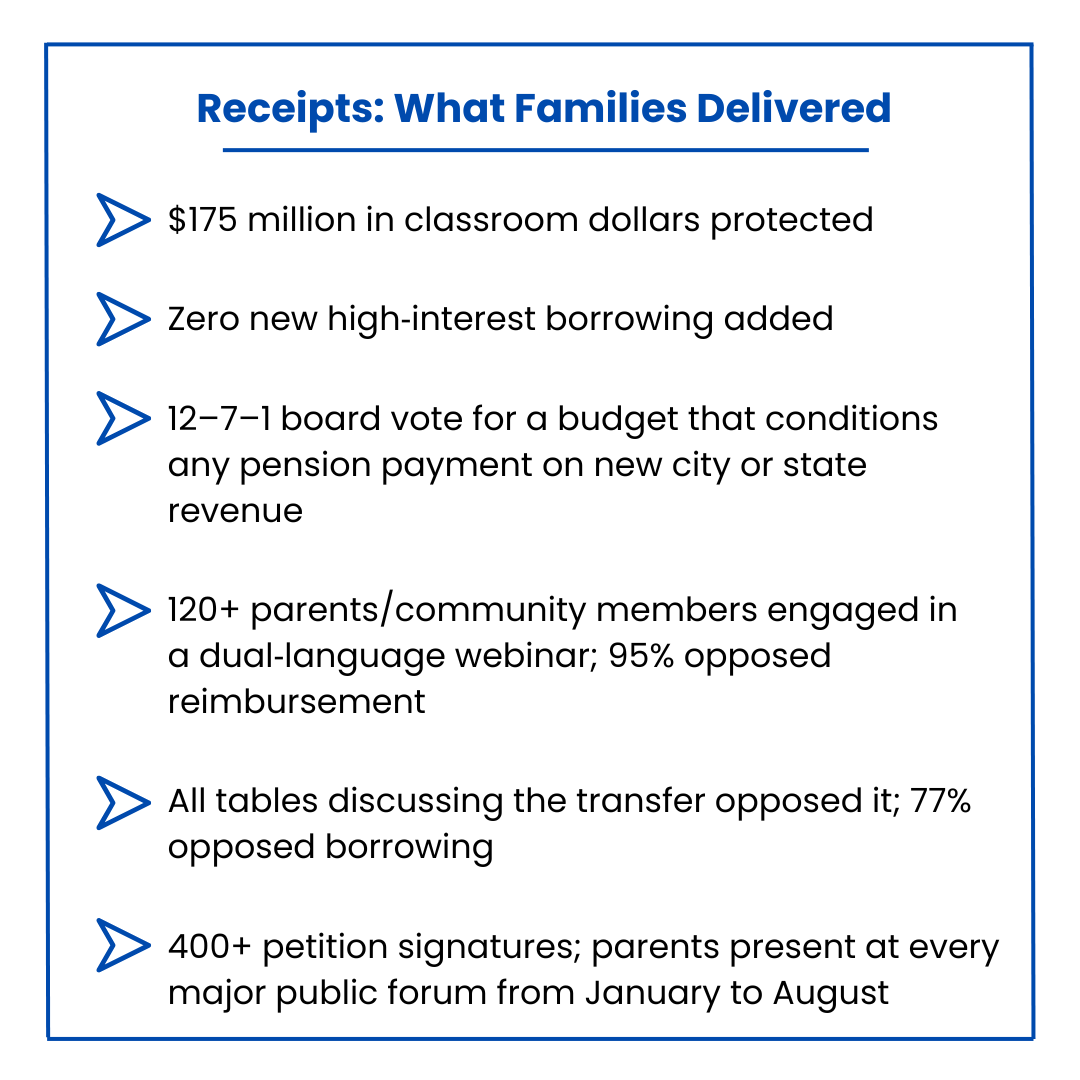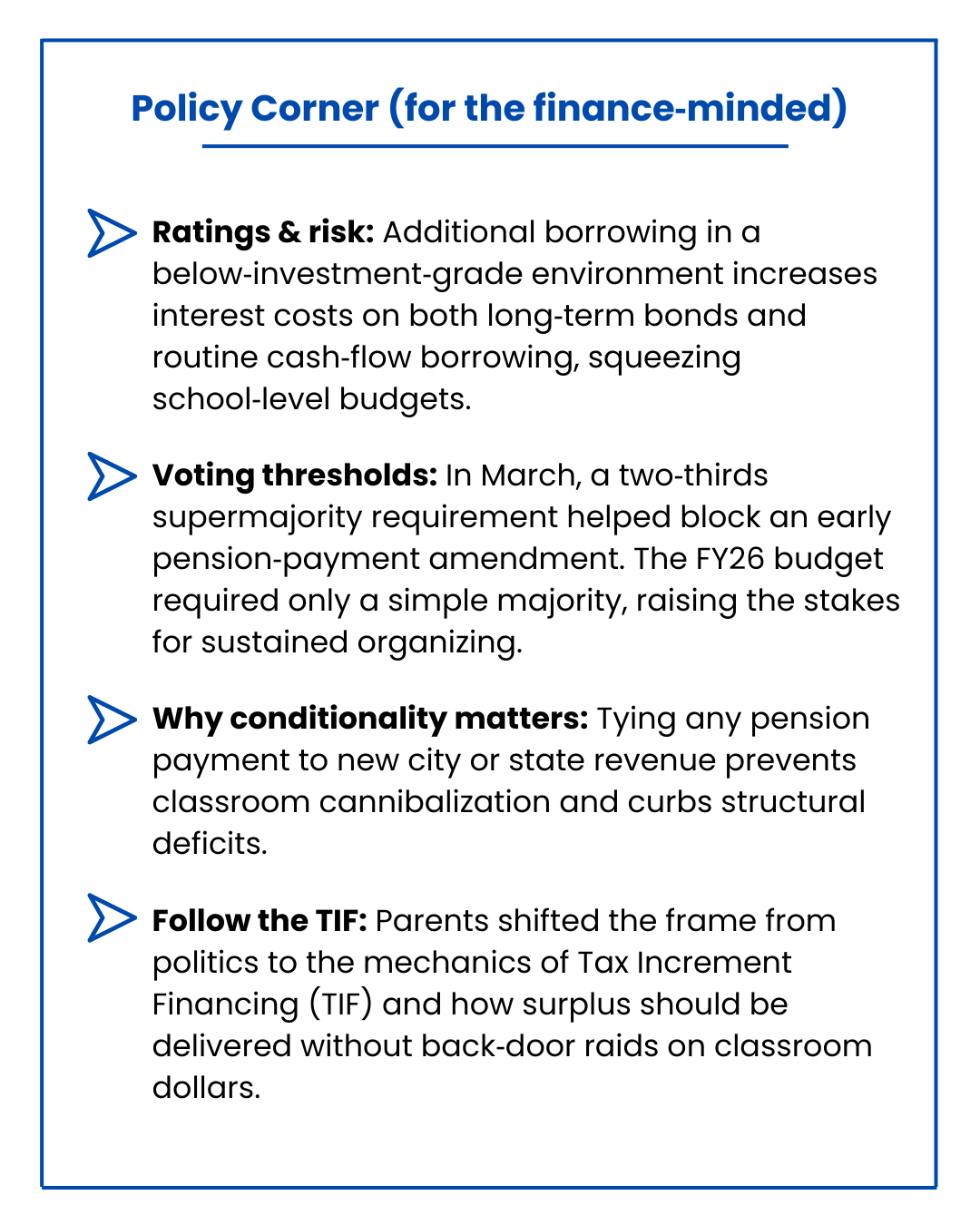Parents Lead the Charge to Protect Chicago Classrooms Against Political Odds
By Keri Rodrigues and Dr. Charles Barone
At the National Parents Union, we exist to put families at the center of decision‑making. This summer in Chicago, that’s exactly what happened – and we couldn’t be prouder of Kids First Chicago (K1C) and the parents who led the way.
Against real political headwinds, Chicago families stopped a plan that would have funneled $175 million out of classrooms and pushed new high‑interest borrowing onto a school system already rated below investment grade (“junk”). On August 28, the Chicago Board of Education approved a $10.2 billion FY26 budget that rejects new borrowing and makes any pension payment to the city conditional on new city or state revenue – not on cutting into kids’ learning. The final vote: 12 in support, 7 opposed, 1 abstention. That is what parent power looks like.
Why This Was The Hill to Fight On
From the outset, K1C prioritized parents as the driving force of the campaign. Through a deep dive on the budget and policy issues, parents learned that credit rating agencies had already rated CPS as “junk.” Taking on additional debt for pensions rather than structural reforms would likely have triggered further downgrades, raising the cost of future borrowing.
That, in turn, would have made school construction, technology upgrades, and even cash-flow borrowing more expensive. Over time, more of the CPS budget would go toward servicing debt and less toward teacher salaries, class size reduction, instructional materials, and student supports. Students would experience the squeeze as fewer resources in their schools.
Parents Leading Advocacy
Through bilingual education, accessible tools, and direct access to decision-makers, families were empowered to speak for themselves in meetings, testimony, and media coverage. Parents attended CPS budget roundtables, hosted webinars, and submitted public comments, ensuring their voices were heard at every stage of the decision-making process.
The campaign’s success hinged on building trust with parents over years of engagement. By helping families understand CPS’s complex budget dynamics and navigate systems of power, K1C laid the groundwork for meaningful advocacy. This trust proved essential when the stakes were highest, as parents mobilized to oppose the pension payment and borrowing proposal.
Early Wins and Strategic Alignment
The campaign began in January 2025 with a focus on responsible governance. K1C framed the issue early through reports, op-eds, and meetings with civic partners like the Civic Federation and the Chicago Public Education Fund. By March, the campaign had gained significant momentum. A dual-language webinar drew over 120 attendees, with live polling showing 95% opposition to CPS reimbursing the city for its pension payment. Parents met with CPS board members, published op-eds, and launched a petition that quickly surpassed 130 signatures.
These efforts culminated in a decisive victory in March, when CPS board members opposed the pension payment amendment, preventing it from reaching the floor for consideration. The campaign’s success was aided by the requirement for a two-thirds supermajority vote, which raised the bar for passage. However, the summer budget campaign would prove far more challenging, as the FY26 budget required only a simple majority to pass.
Summer Struggles Against Political Odds
By July, the odds were stacked against parents. The proposal to borrow and cover the city’s pension obligation was supported by both the mayor and the Chicago Teachers Union (CTU), with backing from a majority of the CPS board, including ten mayoral appointees and two members elected with CTU support. The newly appointed interim superintendent, Dr. Macquline King — who came directly from the mayor’s office prior to her appointment — signaled early support for including the payment in the budget. Despite these challenges, parents persisted through steady engagement, strong partner alignment, and near-daily communication with media and board members.
The stakes could not have been clearer: this debate had already triggered the resignation of the entire prior board and the ouster of the previous superintendent, vivid reminders of how far the mayor was willing to go to impose his position. The message was unmistakable — raw political power would steamroll any opposition, even his own allies.
Parents attended all five CPS budget roundtables in July, where CPS later reported that every breakout table discussing the pension transfer opposed making it, and 77% of tables discussing borrowing opposed it. Their presence at these meetings, coupled with public education efforts, clearly resonated. By August, petition signatures had surpassed 400, and parents continued to attend board meetings, submit testimony, and engage directly with board members.
A Decisive Victory
The turning point came in early August, when Dr. King released what many parents viewed as a principled proposed budget. It excluded new borrowing and made the pension payment conditional on additional city or state revenue.. Parents immediately activated to publicly support the budget, ensuring their voices were heard in the final stretch. On August 28, the CPS board approved a $10.2 billion FY26 budget that rejected high-cost borrowing and conditioned any pension payment on new revenue. The final vote surprised everyone: 12 in support, 7 opposed, and 1 abstention.
This victory was a testament to the power of parent advocacy. Families spoke for themselves in rooms, on calls, and in media coverage, shaping the conversation and influencing board members’ decisions. Their efforts shifted the focus of media and board deliberations toward classroom protection, debt risk, and the mechanics of tax increment financing (TIF) law, rather than city politics.


Lessons Learned and What’s Next
The campaign highlighted several key lessons. First, long-standing trust with parents is essential for effective advocacy. Parents were the ones who decided what K1C’s position would be and it was parents who were the vanguard of the entire effort. Second, starting early and educating continuously pays off when decisions peak months later. Third, bilingual, accessible tools – such as live polling, explainers, and petitions – help move people from awareness to action. Finally, credible partners like the Civic Federation and SEIU added decisive leverage, reinforcing facts and priorities.
Looking ahead, K1C plans to monitor the city’s delivery of pledged TIF surplus, advance conversations about sustainable state revenue, and continue public education on CPS’s debt load. The organization also aims to maintain and grow its network of more than 1,000 parents for ongoing budget advocacy.
A Model for Parent Power
Some will say this was about politics. It wasn’t. It was about protecting classrooms and preserving CPS’s long‑term financial health. Families – organized by Kids First Chicago – changed the conversation and the outcome. Anchored in what is best for their children, and being willing to speak truth to power, they proved that when parents lead with facts and persistence, they can reset the terms of debate, even when the odds look bad on paper.
To the parents and team at K1C: NPU is proud of you. To families elsewhere: if your district is tempted to balance the books on the backs of kids, look to Chicago. Living rooms beat war rooms – when parents lead.